Draft Newsletter as of January 14, 2016
Draft newsletter for Sunday January 17, 2016. Newsletters can be found in the archives by Friday, also. http://www.zetatalk.com/newsletr/index.htm
Permafrost Melting
The permafrost is melting, due to the Earth wobble bringing warm air into the Arctic, and friction of the Earth plates which are being jerked around during the wobble, and the roiling of the magma under the magnetic influence of Nibiru, aka Planet X. Melting permafrost has been an issue since Nibiru arrived in the inner solar system in 2003. By September 6, 2006, reports from the journal Science and the journal Nature were that the permafrost was melting faster than expected, releasing gasses such as Methane. Where this is ascribed to Global Warming, the permafrost is several feet deep, underground, and does not react to a degree or two of warming on the surface. In addition, heat rises. The permafrost is melting from the bottom up, as heat rises.
Permafrost
http://www.global-greenhouse-warming.com/permafrost.html
Permafrost is any rock or soil material that has remained below 32° F (0° C) continuously for two or more years. Areas of forest are now referred to as ‘drunken forests’, and as it melts the trees fall over. The slow melting of the permafrost layer which underlies much of the Arctic tundra could turn the ground into a messy quagmire. This could affect northern transportation since in many areas surface travel is possible only when the ground is frozen solid.
Methane a New Climate Threat
Sep 6, 2006
http://abcnews.go.com/Technology/wireStory?id=2402638
Methane, a greenhouse gas 23 times more powerful than carbon dioxide, is being released from the permafrost at a rate five times faster than thought, according to a study being published in the journal Nature. Most of the methane-releasing permafrost is in Siberia.
Melting and cracking permafrost, and the methane beneath is, was covered in Issue 292
http://www.zetatalk.com/newsletr/issue292.htm
in 2012, and again in 2014 in Issue 427
http://www.zetatalk.com/newsletr/issue427.htm
when a methane gas flash startled commuters in the Urals, turning night into day.
What was the Mysterious Flash that Lit Up Russian Sky for 11 Seconds, 'Turning Night into Day'?
November 18, 2014
http://www.dailymail.co.uk/news/article-2839831/What-mysterious-fla...
A huge flash in the night sky over Russia is raising suspicions after the authorities refuse to comment on its cause. The eruption lit up the sky near Yekaterinburg for 11 seconds in what appeared to a major aerial explosion. The strange light was not accompanied by any sound, according to eyewitnesses, although Russian authorities are refusing to comment on the event. Theories for the explosion included a missile or an object from space.
ZetaTalk Response 11/22/2014:
http://www.zetatalk.com/ning/22no2014.htm
What happens when long frozen land, formerly tropical so that trapped vegetation has evolved into methane gas, gets stretched? Methane releases, and being lighter than air, rises. A spark of any kind will light this highly flammable gas. Air layers passing over one another are sufficient to spark this, as this is what causes lightning to spark. A slight difference in the electrical charge is all that is required.
For the Russians this is an immense problem, as vast areas of Siberia and the Russian Far East are engulfed in permafrost. The Russian population will need to move to their Far East after the Pole Shift, given the flooding that will occur when the sea level rises. What to do? Per the Zetas, build on solid rock, not soil, anticipating the permafrost melt.
Permafrost
http://www.wunderground.com/climate/permafrost.asp
Permafrost is permanently frozen soil, and occurs mostly in high latitudes. Permafrost comprises 24% of the land in the Northern Hemisphere. The majority of permafrost in the Northern Hemisphere occurs in the Eastern Hemisphere, in Siberia and the Far East of Russia, as well as northern Mongolia, northeastern China and the Tibetan Qinghai-Xizang Plateau.
The Permafrost Continues to Melt, and the Scientists and Officials almost no Answers
October 6, 2011
http://inosmi.ru/ecology/20111006/175608753.html
Permafrost covers 10.7 million square kilometers of the territory of Russia - about 63% of the whole country. Similarly, the infrastructure, including roads and railways, high-rise apartment buildings, and oil and gas industry, are built directly on the frozen ground. But all that could change if permanently frozen layer below the seasonal thaw way surface starts to melt too. "Russian Railways" is the operator for more than five thousand kilometers of railways in permafrost regions, they say, is already familiar with the problem, and regularly fight with settling the railroad tracks. "The main effect of the melting of the permafrost - is subsidence. There are areas of land that are flooded or shifted in unpredictable ways. This can manifest itself as a local subsidence, of a few tens of meters, and can be as long wavy line that stretches a kilometer or more, "- note the" Russian Railways "in a written statement describing the impact of melting permafrost on the landscape" . The resulting "thermokarst" the landscape is characterized by rapidly emerging lakes and irregular hills interspersed with swamps. What makes the situation even worse, resulting from accumulation of water lead to a reduction of the upper level of the permafrost, causing flooding. It also reduces the carrying capacity of the land, says the company. But suffer not only railways. In earlier reports on the impact of global warming from the Federal Meteorological Service noted that "the power of the bases of buildings and engineering structures located in the permafrost zone, dropped in some regions of Siberia" because of changes in the carrying capacity of the earth caused by the warming and the increasing depth of seasonal thawing .
ZetaTalk Advice 1/9/2016:
http://www.zetatalk.com/ning/09ja2016.htm
Those living in a permafrost region have no choice but to suffer through the melt, which in any case will be a limited time period. The new Equator will run through the Arctic, such will be the regions exposure to full Sun. How long will a bit of frozen ground last in the Tropics? It would be melted within weeks. The struggle with melting permafrost at present is due to the Earth wobble putting these regions under more warn air and to some degree under more sunlight. It is slight, but enough to open eyes as to what will happen with infrastructure built over permafrost.
The ground will soften, in many cases be mushy as the surface melt has nowhere to drain until the thaw is complete. Combined with mushy ground and warping railroad lines and destabilized building foundations, regions such as Siberia must anticipate methane explosions. These can be horrific, though rare, and cannot really be predicted ahead of time unless a means to determine a methane cloud underground can be developed, so these could be punctured to release ahead of an explosion. New settlements should be located on solid rock, not permafrost soil, and existing settlements relocated if possible.
Nibiru Naked Eye
Increased visibility was predicted by the Zetas for the 8 of 10 phase, which is now. The 7 of 10 phase, plate movements, was delayed, held back by the Council of Worlds, to allow Obama and his partners to arrange the announcement admitting that Nibiru exists and is nearby, approaching. For those new to this information, the 9 of 10 phase is the Last Weeks, a period of time that lasts approximately two months, and the 10 of 10 is the hour of the Pole Shift itself. As the Pole Shift ning
https://poleshift.ning.com/profiles/blogs/please-place-your-planet-x
blog dedicated to photos of the Planet X, aka Nibiru complex shows, visibility, naked eye visibility, is indeed increasing!
A photo taken in Sweden on January 6, 2016 shows an orb at the 1 o’clock position. Pluto is in the vicinity, but Pluto is NOT visible naked eye and requires a high powered scope. This is undoubtedly a Moon Swirl, from the tail curling around below and then above the Sun in the retrograde direction of Nibiru’s orbit past the Sun, rotation, and tail swirling motion.
A video capture
https://www.youtube.com/watch?v=zy2xat-VRuU
taken in Poland on December 31, 2015 shows a brilliant orb at the 6 o’clock position to the Sun. The bright orb is not a lens flare nor a ghost in the camera, nor are two other faint orbs to the left of the Sun. These orbs were visible naked eye as the reaction of the little girl excitedly pointing to the horizon shows. A zoom of the Nibiru object shows the double helix created by the two dominant Moon swirls on either side of Nibiru, as noted in the comments on the video.
The large red object identifies itself as Niburu with its two wings.?
There are NO planets in the vicinity of the Sun at sundown, in this view from Poland, but the location vs a vs the Sun is similar to where Nibiru is found at sundown in webcam captures
https://poleshift.ning.com/profiles/blogs/nibiru-daily-on-webcam
in Italy and France. These webcam captures, made almost daily, also regularly show the double helix.
Filtered photos, such as this one from Idaho filmed on December 26, 2015 show the Moon Swirls in the same approximate location as the Poland video – to the left hand side.
Naked eye, unfiltered photos from Maryland also show these Moon Swirls clustered to the left and Nibiru itself. The green orb at far right is likely a lens flare, and characteristically, its location changes vs a vs the Sun from snapshot to snapshot. Lens flares can be identified when the camera is moved around, as they likewise move around. The other Moon Swirl orbs and Nibiru at the 5 o’clock position remain static.
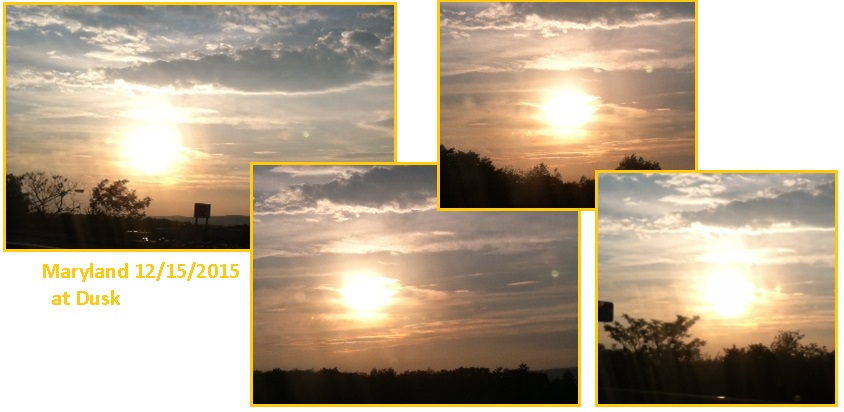 The Maryland photographer researched the location of the other planets, and determined they were not in the vicinity. Skymap confirms this, showing them not at all near the Sun. In any case, the visibility of the other planets is not possible except with a high powered scope, except for Mars and Venus which are close enough to appear as a dim star. Note that Nibiru appears at the 5 o’clock position in the photos, appropriate for the slant of the Ecliptic in the view from Maryland.
The Maryland photographer researched the location of the other planets, and determined they were not in the vicinity. Skymap confirms this, showing them not at all near the Sun. In any case, the visibility of the other planets is not possible except with a high powered scope, except for Mars and Venus which are close enough to appear as a dim star. Note that Nibiru appears at the 5 o’clock position in the photos, appropriate for the slant of the Ecliptic in the view from Maryland.
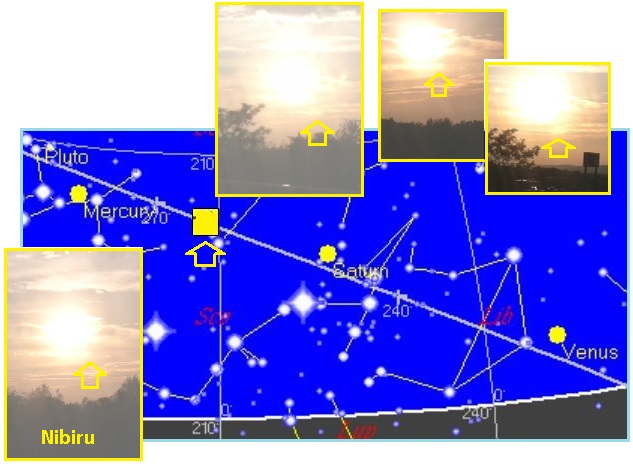 All these pictures were taken on December 15 2015 in Western Maryland, and below is the location of all planets for December. No mention of any planet in the dusk sky at this time. The planets in December 2015: Mercury is invisible for much of the month, having reached superior conjunction on the far side of the Sun on 17 November. It is now an evening sky object, drawing to its greatest eastern elongation on 29 December, but it never gets very high above the south-western horizon from northerly latitudes. Venus continues to shine brilliantly in the morning sky, in the constellation of Virgo. The planet, which resembles a little gibbous moon through a telescope, is gradually drawing back onwards the Sun but remains a prominent pre-dawn object through the end of the year. Mars is another morning planet, also in Virgo, but much less bright than Venus at magnitude +1.4. It will steadily brighten over the next few months as it approaches opposition, its closest approach to Earth, in May 2016. Jupiter is a very bright object in Leo, shining at magnitude -2. It rises not long after midnight at the start of the month and a couple of hours earlier by the end of the year. A small telescope will reveal the bands on this gas giant’s cloud tops and the four main moons strung out either side of it. Saturn was at conjunction last month, on the far side of the Sun, and now emerges into the morning sky. You may find it rising an hour or so before the Sun at magnitude +0.4 in the latter part of December.
All these pictures were taken on December 15 2015 in Western Maryland, and below is the location of all planets for December. No mention of any planet in the dusk sky at this time. The planets in December 2015: Mercury is invisible for much of the month, having reached superior conjunction on the far side of the Sun on 17 November. It is now an evening sky object, drawing to its greatest eastern elongation on 29 December, but it never gets very high above the south-western horizon from northerly latitudes. Venus continues to shine brilliantly in the morning sky, in the constellation of Virgo. The planet, which resembles a little gibbous moon through a telescope, is gradually drawing back onwards the Sun but remains a prominent pre-dawn object through the end of the year. Mars is another morning planet, also in Virgo, but much less bright than Venus at magnitude +1.4. It will steadily brighten over the next few months as it approaches opposition, its closest approach to Earth, in May 2016. Jupiter is a very bright object in Leo, shining at magnitude -2. It rises not long after midnight at the start of the month and a couple of hours earlier by the end of the year. A small telescope will reveal the bands on this gas giant’s cloud tops and the four main moons strung out either side of it. Saturn was at conjunction last month, on the far side of the Sun, and now emerges into the morning sky. You may find it rising an hour or so before the Sun at magnitude +0.4 in the latter part of December.
Signs in the Sky
Signs in the sky have likewise been on the increase because of the approach of Nibiru and the wafting of its charged tail. Argentina got a double whammy recently, on January 4, 2016, when a Second Sun was visible at the same time methane beacons lit up. Per the Zetas, these methane beacons are rapidly rising methane gas, which is lighter than air.
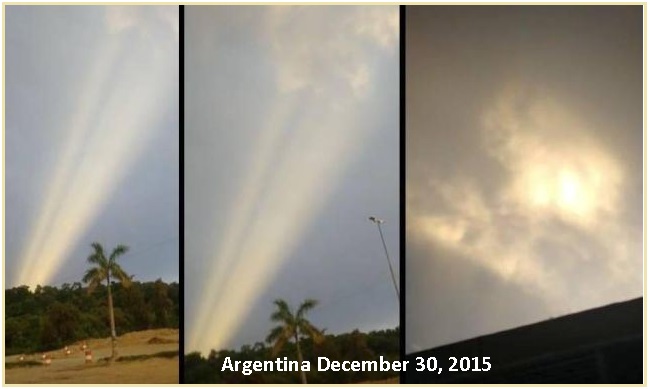 Mysterious Beams of Light and Two Suns appear in the Sky over Argentina
Mysterious Beams of Light and Two Suns appear in the Sky over Argentina
January 4, 2016
https://missiongalacticfreedom.wordpress.com/2016/01/04/mysterious-...
More and more beams of light and two suns appear in the sky across the world. The latest of the eerie phenomenon occurred in the area Hipolito Yrigoyen of Argentina, where residents of the town of Oran witnessed two suns and a beam of light, just before a heavy thunderstorm and extreme winds engulfed the area on December 30, 2015.
ZetaTalk Explanation 8/22/2015:
http://www.zetatalk.com/ning/22ag2015.htm
A light tower of burning methane burns directly upward as methane is lighter than air and rises quickly in the atmosphere. Released by shifting rock or rock layers under a stretch during plate movements, in most cases this methane whooshes upward and disburses. But during a lightning storm, or in stormy weather where air layers are creating friction and thus sparks, and in particular where lightning is present, the methane will alight. The scenes caught on video include at least once instance where the methane tower flashes and then is gone, just that quick. Note that almost all the captures of these towers are showing storm clouds, often low to the ground. Why do the towers have the appearance of straight sides, like a tube? When seen from a distance they appear like a flame, narrow at the base and then broadening out. The recent methane tower captures are close at hand, in low lying clouds, so the lit methane is under pressure and blowing out of the ground where seen, thus the tube appearance.
Odd lightning is also on the increase, and per the Zetas mankind can anticipate this will continue to increase as rock tension and the wafting of the charged tail of Nibiru are on the increase. Ball lightning in Australia is not uncommon, as the continent is under a bending stress. These are known as the Min Min lights. Ball lightning
https://theconversation.com/ball-lightning-exists-but-what-on-earth...
in the atmosphere is also not uncommon. A recent flash of light over Canberra on January 4, 2016 was captured on video, and caused a stir. But per experts, this is just another example of ball lightning.
http://www.abc.net.au/news/2016-01-04/strange-light-above-canberra-...
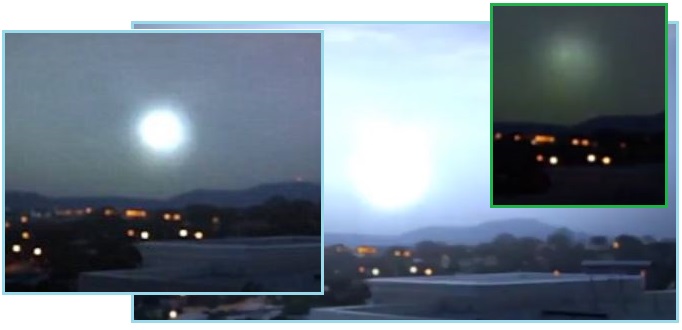 Mysterious Spherical Light filmed Lighting up the Sky above Canberra
Mysterious Spherical Light filmed Lighting up the Sky above Canberra
January 4, 2016
http://www.dailymail.co.uk/news/article-3384769/Mysterious-spherica...
A spherical ball of light lit up the skies of the Australian Capital Territory before quickly disappearing into thin air. A video shows a doughnut shaped orb appearing above Canberra during a storm on Sunday night, faintly backlit with a red and green glow. The incident has been speculated to be extraterrestrial by some social media users, while experts suggest that it may be the equally mysterious weather phenomenon known as 'ball lightning.'
ZetaTalk Comment 3/29/2014:
http://www.zetatalk.com/ning/29mr2014.htm
We have often mentioned that the electronic screech prior to earthquakes is due to air pockets within the rock being compressed so water can touch all side, allowing electrons to flow. Ball lightning is also a phenomena not unknown to man. We have explained that ball lightning occurs when an immense charged field develops, and the desert area over the Channel Country is thus, due to the bending it endures. Why do the Min Min seem to follow cars but remain out of reach? The car’s electrical system is an attractant, but likewise this ball lightning is held in a suspension of electron related particle flows. Any excess of a particular charge, even that coming from a human, acts as a repulsion.
Magnetic swirls have been appearing in the skies since the charged tail of Nibiru has been wafting Earth. This dramatically hit the news in 2009 when a magnetic swirl, in association with a blue neon cloud, grounded in Norway.
http://www.zetatalk.com/index/zeta551.htm
Then in 2015 a number of these magnetic swirls, also accompanied by blue neon clouds, were over the skies of California,
http://www.zetatalk.com/ning/14no2015.htm
forcing air traffic to land and leave from LA overland rather than over the ocean. Now hitting the media is a swirl over CERN, which dissipated suddenly when a UFO appeared and flew into the center of the swirl. All this was caught on video,
https://www.youtube.com/watch?v=ST6X0Ra7zOQ
and the Zetas explain.
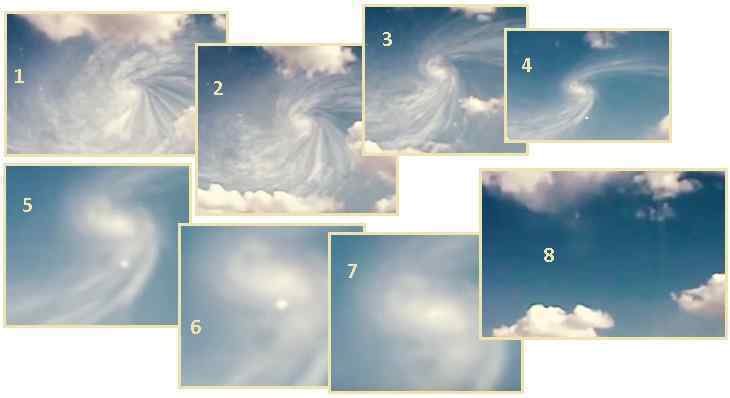 ZetaTalk Confirmation 1/9/2016:
ZetaTalk Confirmation 1/9/2016:
http://www.zetatalk.com/ning/09ja2016.htm
This is a legitimate video capture of a temporary situation, rising suddenly and dissipating just as quickly. This swirl over CERN is a magnetic swirl that was just developing. Indeed a UFO dove into the center of the swirl, to disrupt the process. This was done so that panic and rumors about CERN would not develop. The swirl was a result of Europe being in the stretch zone, subject to rock being pulled apart from Scandinavia to Tibet, and this creates lots of electronic screech in the rocks. Problems with air travel have resulted, the Germanwings crash into the Alps an example. The Germanwings crash occurred close to CERN also. The magnetic swirl developing over CERN had nothing to do with CERN, but would have been misinterpreted had it not been stopped.
8 of 10 Overview
An overview of the 8 of 10 expectations were last presented in Issue 358
http://www.zetatalk.com/newsletr/issue358.htm
of this newsletter on August 11, 2013. In addition to increased visibility of the Nibiru complex, the Zetas predict that Second Sun sightings will occur on a daily basis, around the globe. A blending of the seasons can be expected. We have already had snow in Summer, but the 8 of 10 prediction goes beyond this. The Zetas have hinted that continuous plate movement will happen in some places, and that the continents will become displaced so their relationship to one another is not as it is at present. They gave no further details. The Zetas also included the torquing of the Arabian Plate to the degree that the pointed top plows through the oil fields of Iraq, setting these aflame, as part of the 8 of 10 scenarios.
ZetaTalk Prediction 2/2/2013:
http://www.zetatalk.com/ning/02fe2013.htm
During the 8 of 10, mankind will be aware of the pending passage, whether there is an announcement by NASA and Obama or not. We have described an increased visibility of Planet X, aka Nibiru and its components during the 8 of 10. But has this not already arrived to some degree? One can scarcely go on YouTube without being flooded by videos of Nibiru, aka Planet X and its Moon Swirls. For the 8 of 10, as it progresses, Planet X will be positioned more to the right in the line of sight, so that sunlight will bounce off the dust cloud clinging to and thus shrouding Planet X, supporting dramatic Second Sun sightings on a daily basis, worldwide.
ZetaTalk Prediction 10/8/2011:
http://www.zetatalk.com/ning/08oc2011.htm
We have stated that a blending of the seasons will be a factor, to the extent that the weather would jump from mid-summer to mid-winter within a day or so. We are not there as yet.
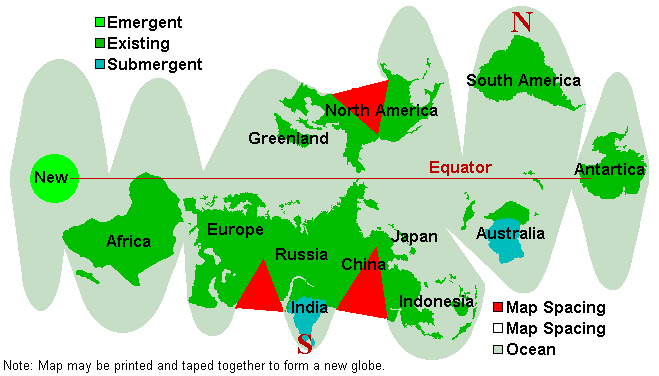 ZetaTalk Prediction 4/9/2011:
ZetaTalk Prediction 4/9/2011:
http://www.zetatalk.com/ning/09ap2011.htm
The exact position of the continents is not in complete accordance with their post Pole Shift alignment, however, but to detail these changes would be getting into the 8 of 10 scenarios prior to the time when we are ready to discuss these scenarios.
ZetaTalk Prediction 6/12/2010:
http://www.zetatalk.com/ning/12ju2010.htm
In that we have also confirmed that burning oil fields in Iraq, caused by the rolling of the Arabian Plate, will be part of an 8 of 10.
Comment
-
Comment by Stanislav on May 14, 2016 at 6:20pm
-
Much of the Arctic is lower than it was before. 12 May, 2016.
More than 20 years of changes in an undisturbed patch of tundra in northern Alaska, east of Kaktovik. Photos courtesy of Janet Jorgenson.
When botanist Janet Jorgenson first visited a patch of tundra east of Kaktovik in 1988, it was flat, dry and thick with 29 species of lichens and mosses. Now, Tapkaurak is wet, gullied and fragrant with sedges and grasses. And, like other parts of Alaska's North Slope, it is a few feet farther from the clouds.
Tapkaurak is part of what might be an arctic-wide thawing, draining and settling of the landscape. More than a dozen scientists coauthored a paper on places undergoing similar changes all over the top of the world. They wrote about 11 sites in Alaska, Russia and Canada.
All of the areas were like Tapkaurak, a control site to be compared to a nearby strip of tundra driven on by oil-exploration vehicles. None of them were bulldozed, buried under gravel or otherwise manipulated by people.
"These are not disturbed areas," said Anna Liljedahl of the University of Alaska Fairbanks, first author of the paper in Nature Geoscience. "The only thing that can explain it is changes in climate."
In the early 1990s, Jorgenson, who works for the Arctic National Wildlife Refuge, began noticing oddities in her 30-foot by 12-foot test strip within sight of the Arctic Ocean.
"My coworker Mike Emers said there was something weird going on with this plot," she said.
Emers told her he couldn't rate the amount of vehicle disturbance because the control strip was sinking almost as much as the driven-on tundra.
“After that we started paying more attention," Jorgenson said.
What's happening at Tapkaurak is the same thing occurring at other places north of the Arctic Circle. Below the ground surface, ice wedges that formed thousands of years ago are melting. Even though northern winters are still cold, recent summer temperatures have been warm enough to melt the top portion of the ancient ice in just a few years. That's creating deeper channels above the ice wedges that often fill with water. Those depressions sometimes connect up to form small streams, allowing water to drain away.
Because ice makes up a good portion of the underground foundation of northern Alaska, thawing has dropped the landscape as much as three feet in some places.
"The whole surface in the Arctic Coastal Plain is sinking," Liljedahl said. "It's like sea-level rise the other way around."
Jorgenson is less certain of universal slumping of the landscape. A majority of plots she's working on have not reacted like Tapkaurak.
"Of 27 control plots, this is the only one with this dramatic subsidence," she said.
It is natural for the tops of ice wedges to melt and refreeze, Jorgenson said. Over several decades, they can grow again after plants pop up in the troughs, cast shade and insulate the ground from summer heat. But that process requires dependable cold, winter and summer.
"We don't have a steady state anymore," she said. "We get more and more of the deep troughs and it's harder to recover."
As Liljedahl was writing the paper, colleagues from all over the world mentioned undeveloped spots that were reacting to warmth the same way.
"If we had the paper in the works for much longer, we would have had an even larger dataset," she said.
Since the late 1970s, the University of Alaska Fairbanks' Geophysical Institute has provided this column free in cooperation with the UAF research community. Ned Rozell is a science writer for the Geophysical Institute. Sources: nature.com; gi.alaska.edu
SEARCH PS Ning or Zetatalk
This free script provided by
JavaScript Kit
Donate
© 2025 Created by 0nin2migqvl32.
Powered by
![]()

You need to be a member of Earth Changes and the Pole Shift to add comments!
Join Earth Changes and the Pole Shift